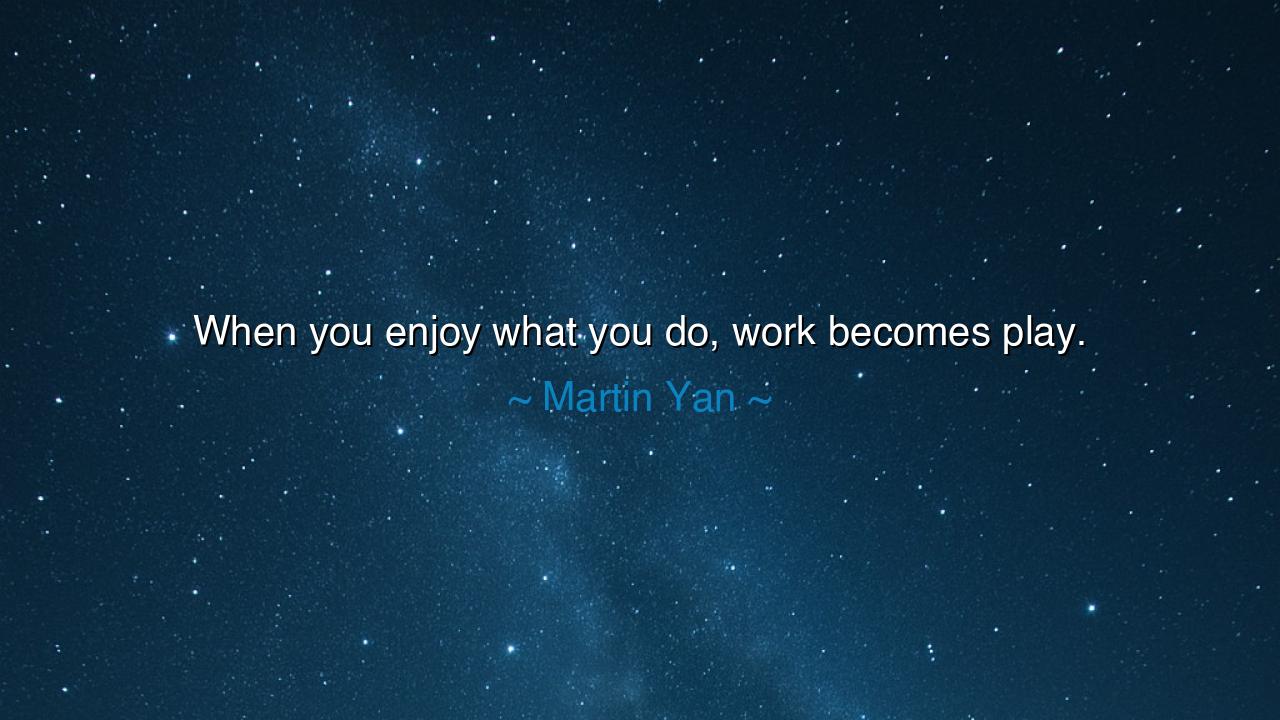
When you enjoy what you do, work becomes play.






The words of Martin Yan shine like a simple proverb, yet within them lies a treasure of truth: “When you enjoy what you do, work becomes play.” At first, it seems light, even playful, but beneath its surface lies the wisdom of the ancients. For what is the burden of mankind but the endless weight of toil? And what is the dream of mankind but to transform that toil into joy? Yan, master of the kitchen, reminds us that the boundary between work and play is not carved in stone—it is drawn in the heart.
Since the dawn of time, man has labored for survival. The hunter ventured into forests not for pleasure but for food; the farmer bent his back beneath the sun not for leisure but for grain. Yet even in these labors, joy could be found. The hunter who thrilled at the chase, the farmer who loved the rhythm of the earth—such men turned necessity into delight. Thus it was written into the soul of humanity that work, when embraced with passion, becomes not drudgery but dance, not burden but blessing.
Martin Yan, the celebrated chef, found his path in the art of cooking. To others, chopping, stirring, and sweating in kitchens may appear as work, a task of endless repetition. But for Yan, it became play—an arena of creativity, laughter, and delight. His famous demonstrations on television were filled not with grim seriousness but with joy, wit, and energy. The knife in his hand was not a tool of labor, but an instrument of performance. He showed the world that even the simplest acts, when done with love, can be lifted into the realm of play.
History offers us another mirror of this truth in the life of Leonardo da Vinci. To him, invention, painting, and discovery were not heavy duties but a kind of divine game. He pursued knowledge with the curiosity of a child, and so his endless hours of labor felt to him like joyous exploration. Had he treated his endeavors as mere work, fatigue would have crushed him. But because he treated them as play, his creations reshaped the world. His life proclaims the same message as Yan’s: when joy and passion guide the hand, labor transforms into something light as air.
Yet beware, O seeker: not all work feels like play. Many walk paths chosen not by their hearts but by the demands of others. They rise each morning with dread, for their labor does not feed their spirit. To such souls, Yan’s words are not a description but a challenge: to seek, if possible, the labor that ignites joy, to weave passion into duty. When the heart aligns with the hand, the hours no longer drag—they flow, swift and bright, like a river to the sea.
The lesson, then, is clear: do not treat joy as a luxury separate from labor. Instead, strive to infuse your work with joy, curiosity, and playfulness. Seek tasks that stir your spirit, and if your duties are fixed, find within them some spark of creativity, some rhythm of play that makes them lighter. Approach your daily labors not with dread, but with the eyes of a child, who can turn a stick into a sword and a chore into a game.
Practical wisdom follows: each day, ask yourself what parts of your work awaken delight, and lean into them. Transform routine into ritual, necessity into art. Smile at the simple, laugh at the small mistakes, and let your passion carry you. For the truth of Martin Yan’s words is not reserved for chefs or artists—it belongs to every soul who dares to find joy in their labor. When you enjoy what you do, work becomes play, and in that transformation, life itself becomes lighter, brighter, and filled with meaning.
Thus remember: the world may demand labor, but you may choose joy. And in that choice, you may turn the stones of work into the jewels of play, leaving behind not just a livelihood, but a life worth living.






QTQuan Tran
This quote is a great reminder of how perspective can change everything. It’s not always about the task itself but how we engage with it. If work feels like play, it’s a sign that we’re tapping into something we love. How do you think someone can cultivate this mindset, especially if they’re struggling with burnout or a lack of motivation?
Nnguyenthicamvan
I find it inspiring how Martin Yan equates enjoyment with work becoming play. It highlights how important it is to have a passion for what you do. But do you think this approach is sustainable in the long run? What happens when the initial excitement wears off or when work-related pressures build up?
QPQuynh Pham
This quote makes me reflect on how much our attitude shapes our experience at work. If you truly enjoy what you do, it doesn't feel like work anymore. How important do you think it is for people to actively pursue careers that align with their interests, or can people find fulfillment even in less exciting jobs?
VDVIE_B12_Khanh Duy
Martin Yan’s quote really resonates with me because it speaks to the power of passion in work. It’s amazing how finding joy in what we do can make all the difference. Do you think this mindset is easier for people who are self-employed or entrepreneurs, compared to those working in more traditional corporate jobs?
QDQuynh Duong
I love this idea of work becoming play when you enjoy what you do. It really shifts the mindset from seeing work as a chore to something you look forward to. How do you think someone can find that kind of passion in their work if they’re stuck in a job they don’t love? Do you think it’s possible to develop that kind of enthusiasm over time?